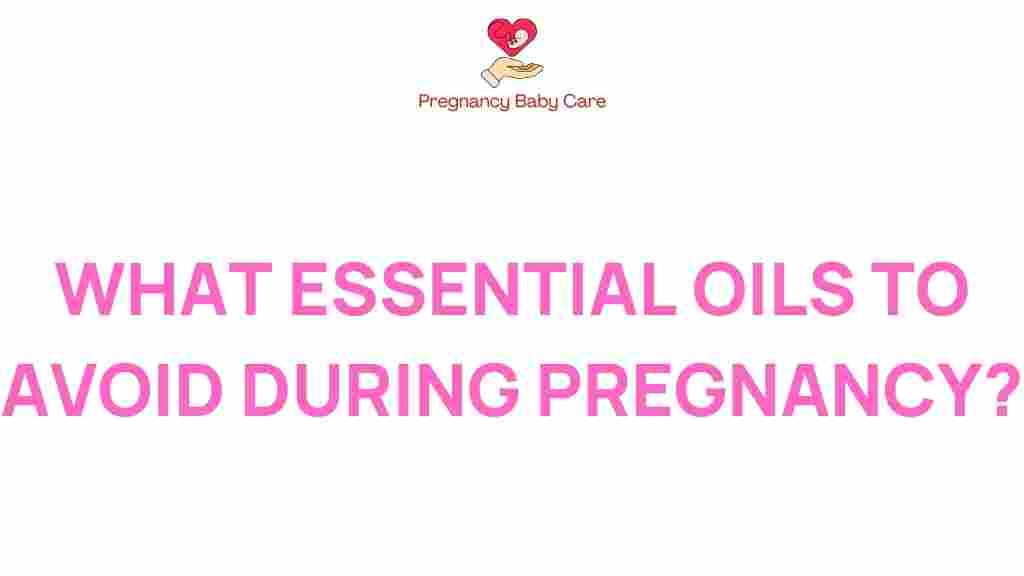Essential Oils and Pregnancy Safety: What You Need to Know
Pregnancy is a beautiful journey, filled with excitement and anticipation. However, it also comes with its share of challenges, including the need to prioritize maternal health and the safety of the developing fetus. Many expectant mothers turn to essential oils as natural remedies for stress relief, nausea, and other pregnancy-related symptoms. While aromatherapy can offer various benefits, it’s crucial to be aware of the health risks associated with certain essential oils during pregnancy. This article will explore the hidden dangers of essential oils to avoid during pregnancy and provide safe alternatives for pregnancy wellness.
Understanding Essential Oils and Their Risks
Essential oils are concentrated extracts from plants, used in aromatherapy for their therapeutic properties. However, not all essential oils are safe for use during pregnancy. Some can stimulate the uterus, affect hormonal balance, or cause allergic reactions, posing potential risks to both the mother and the fetus.
Here are some essential oils to avoid during pregnancy:
- Clary Sage: Known for its ability to stimulate contractions, clary sage should be avoided in pregnancy.
- Rosemary: Can potentially cause hypertension and increase uterine contractions.
- Thyme: May have emmenagogue properties, which can stimulate menstrual flow.
- Pennyroyal: Highly toxic and can induce miscarriage.
- Wintergreen: Contains high levels of methyl salicylate, which can be harmful in large doses.
- Jasmine: Though it has calming effects, it may also stimulate labor and should be used with caution.
Potential Health Risks of Essential Oils During Pregnancy
Using essential oils during pregnancy without proper knowledge can lead to a variety of health issues. Here are some potential risks:
- Uterine Contractions: Certain oils can stimulate contractions, leading to preterm labor.
- Hormonal Imbalance: Some essential oils can affect hormonal levels, potentially leading to complications.
- Allergic Reactions: Pregnant women may experience heightened sensitivity to scents, leading to allergic responses.
- Toxicity: Some oils, when ingested or used improperly, can be toxic to both mother and baby.
Essential Oil Precautions for Expectant Mothers
If you’re considering using essential oils during pregnancy, it’s essential to take certain precautions to ensure safety:
- Consult Your Healthcare Provider: Always discuss with your doctor or midwife before using any essential oils.
- Choose High-Quality Oils: Ensure you use pure, therapeutic-grade essential oils from reputable sources.
- Use in Moderation: If you choose to use essential oils, do so sparingly and in diluted forms.
- Avoid Ingestion: Do not ingest essential oils unless advised by a qualified healthcare professional.
- Patch Test: Conduct a patch test to check for any allergic reactions before using any oil on your skin.
Safe Alternatives to Essential Oils
While it’s important to be cautious with essential oils, there are many safe alternatives that can promote pregnancy wellness. Here are some options:
- Lavender: Known for its calming effects, lavender can help with relaxation and sleep when used in moderation.
- Chamomile: A gentle oil that may help with anxiety and promote restful sleep.
- Frankincense: Often used for its grounding properties and can support emotional well-being.
- Ginger: A great remedy for nausea, ginger essential oil is generally considered safe in small amounts.
- Citrus Oils: Oils like sweet orange can uplift mood and create a refreshing atmosphere.
Step-by-Step Process for Using Essential Oils Safely During Pregnancy
To ensure you can safely incorporate essential oils into your routine while pregnant, follow this step-by-step process:
- Research: Familiarize yourself with essential oils and their effects, focusing on which are safe and which to avoid.
- Consult Your Provider: Speak with your healthcare provider about any essential oils you are considering.
- Choose Safe Oils: Select essential oils that are known to be safe during pregnancy.
- Dilution: Always dilute essential oils with a carrier oil, such as coconut or jojoba oil, before applying to the skin.
- Use a Diffuser: If using oils for aromatherapy, consider using a diffuser to disperse the scent throughout the room.
- Monitor Reactions: Pay attention to how your body responds to the oils. Discontinue use if you notice any adverse effects.
Troubleshooting Tips for Essential Oil Use
If you encounter any issues while using essential oils, consider the following troubleshooting tips:
- Allergic Reactions: If you notice skin irritation or respiratory issues, stop using the oil immediately.
- Nausea or Headaches: If you feel nauseous or develop a headache, ventilate the area and discontinue use.
- Consult Your Doctor: If any symptoms persist, seek advice from your healthcare provider.
Conclusion: Prioritizing Pregnancy Safety
While essential oils can offer benefits, it’s vital to prioritize pregnancy safety and be aware of the potential hazards associated with their use. Always consult healthcare professionals, choose safe alternatives, and practice caution with any natural remedies. By doing so, you can enjoy the therapeutic qualities of aromatherapy while ensuring the well-being of both yourself and your baby.
For more information on maternal health and safe practices during pregnancy, visit this resource. Remember, your health and your baby’s health should always come first.
Explore safe alternatives to enhance your pregnancy wellness without the risks associated with certain essential oils. Embrace this special time with confidence, knowing you are making informed choices for yourself and your child.
This article is in the category Pregnancy and created by PregnancyBabyCare Team
